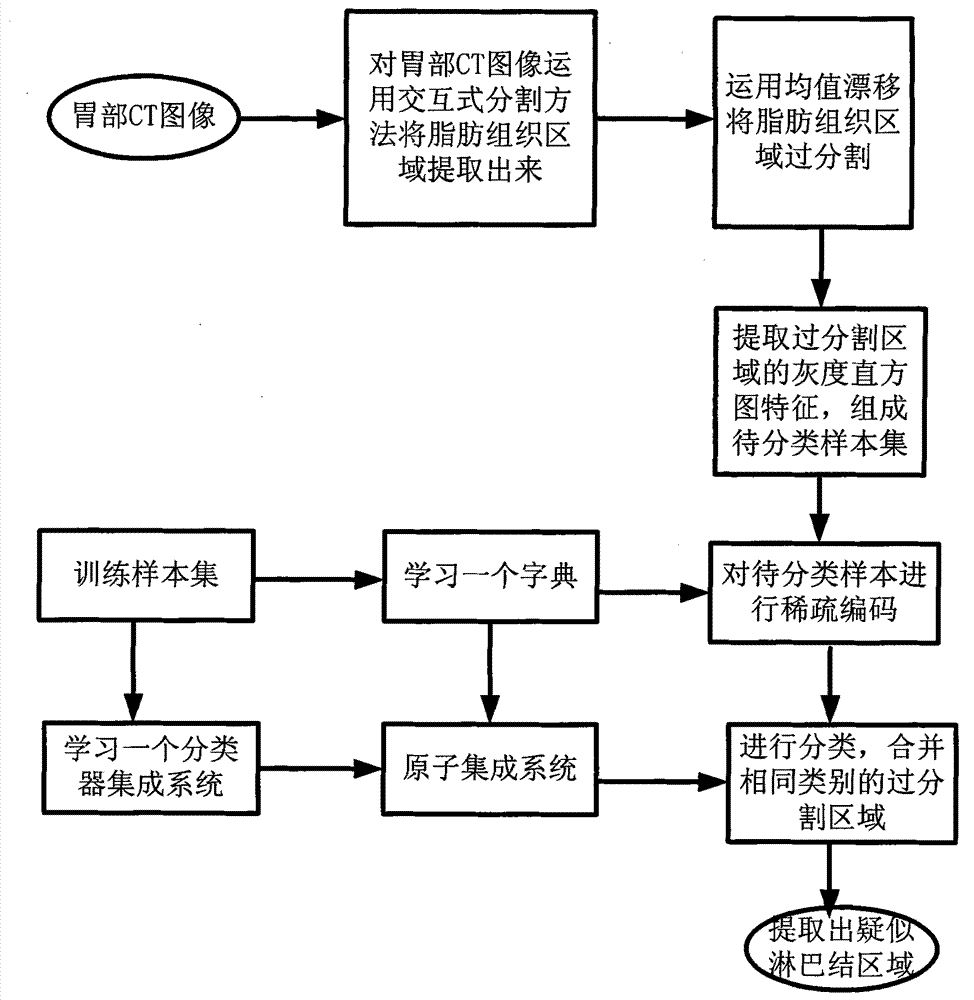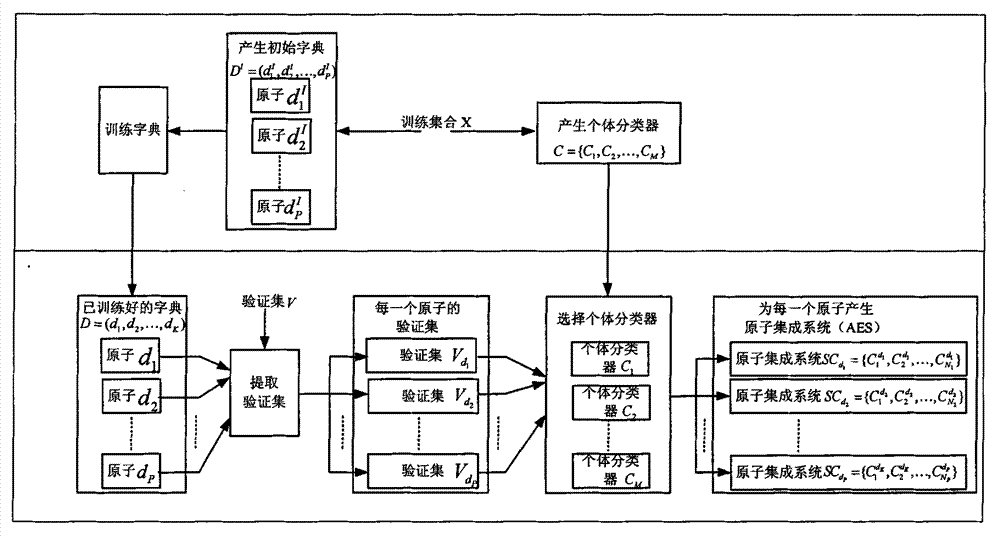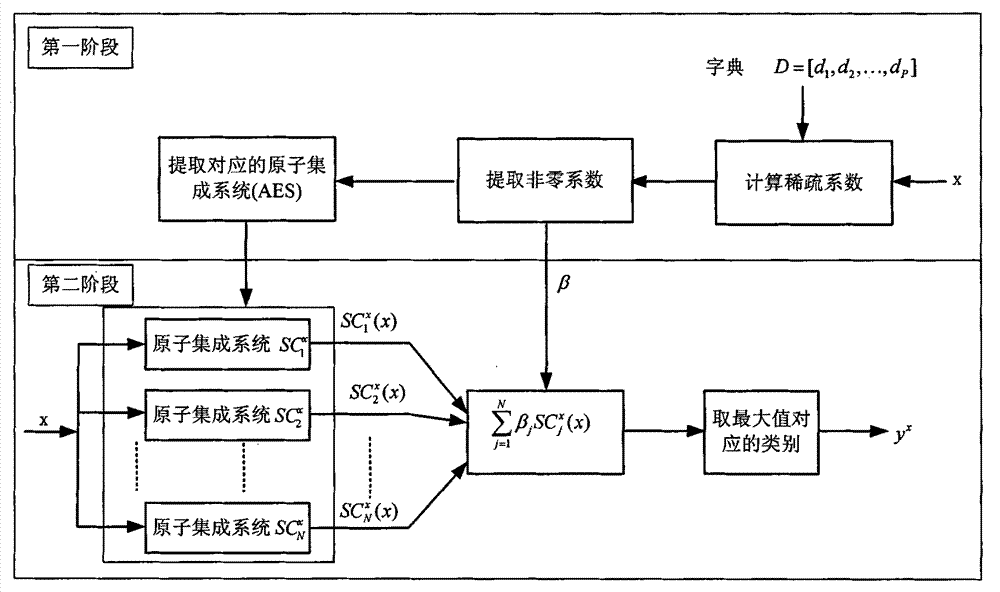Method for extracting stomach CT (Computed Tomography) image suspected to be lymph node based on sparse dynamic integrated selection
A CT image and extraction method technology, applied in the field of medical image processing, can solve problems such as high computational complexity and time-consuming, achieve good classification performance and reduce computational complexity
- Summary
- Abstract
- Description
- Claims
- Application Information
AI Technical Summary
Problems solved by technology
Method used
Image
Examples
Embodiment 1
[0046] The present invention is a sparse dynamic integration selection method for extracting suspected lymph nodes from gastric CT images. Currently, CT images are commonly used imaging methods. To realize the extraction of suspected lymph node areas in fat tissue areas of CT images, the fat tissue areas must be extracted first. . Lymph nodes are mainly distributed in the adipose tissue around the stomach wall, so accurate segmentation of adipose tissue is of primary importance.
[0047] In the present invention, the process of extracting suspected lymph node regions from images of gastric adipose tissue is as follows: figure 1 shown. The specific description is as follows:
[0048] Step 1, extract a CT image of the stomach, see Figure 4 (a). The stomach CT images used in this example are from Beijing Cancer Hospital. Each CT image consists of 512x512 pixels. All image processing experiments are implemented on the MATLAB2009a experimental platform.
[0049] Step 2, artif...
Embodiment 2
[0066] The method for extracting suspected lymph nodes from gastric CT images selected by sparse dynamic integration is the same as in Example 1, wherein the process of using the sparse dynamic integration selection method described in step 5 to classify the extracted adipose tissue region sample set to be classified includes a training phase and a test stage:
[0067] The flow chart of the training phase is as follows figure 2 As shown, the specific process is:
[0068] 5.1 Select training samples from some marked images of adipose tissue that have been successfully classified, and the training samples are denoted as X={(x i ,y i )|x i ∈ R F ,y i ∈ {1, 2, ..., L}, i = 1, 2, ..., r}, where x i is the grayscale histogram feature extracted from the labeled image of adipose tissue, y i is the label of the sample, F is the dimension of the proposed gray histogram feature, L is the number of categories to be segmented, and r is the number of samples to be extracted; the num...
Embodiment 3
[0091] The method for extracting suspected lymph nodes from gastric CT images selected by sparse dynamic integration is the same as in Embodiment 1-2. In this example, the effectiveness of the present invention is verified by simulation experiments using gastric CT images from Beijing Cancer Hospital. Each image consists of 512x512 pixels, and three images are selected for experiments. All experiments are implemented on the MATLAB2009a experimental platform. Figure 4-Figure 6 Adipose tissue extraction results for three images. exist Figure 4-Figure 6 Among them, for each picture, (a) is the original image, (b) is the result after inputting the interactive information, (c) is the accurate fat tissue area extraction result, (e) is the fat tissue obtained by the method used in the present invention The results of tissue region extraction, (d) is the partial enlarged image corresponding to (c), and (f) is the partial enlarged image corresponding to (e). Figure 4-Figure 6 The ...
PUM
 Login to View More
Login to View More Abstract
Description
Claims
Application Information
 Login to View More
Login to View More - R&D
- Intellectual Property
- Life Sciences
- Materials
- Tech Scout
- Unparalleled Data Quality
- Higher Quality Content
- 60% Fewer Hallucinations
Browse by: Latest US Patents, China's latest patents, Technical Efficacy Thesaurus, Application Domain, Technology Topic, Popular Technical Reports.
© 2025 PatSnap. All rights reserved.Legal|Privacy policy|Modern Slavery Act Transparency Statement|Sitemap|About US| Contact US: help@patsnap.com



